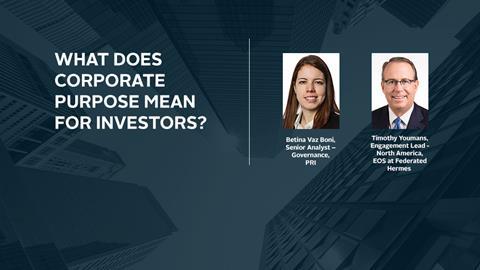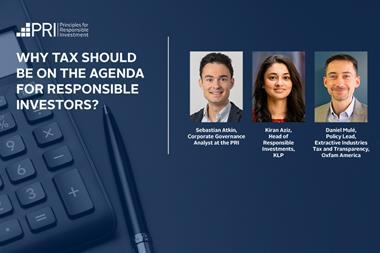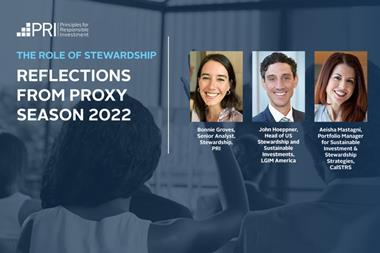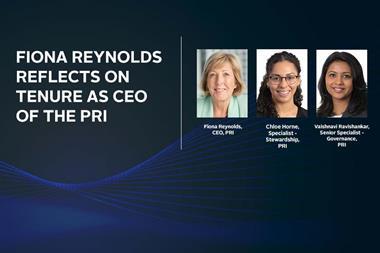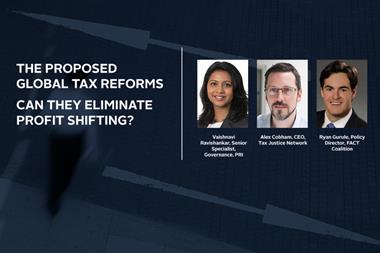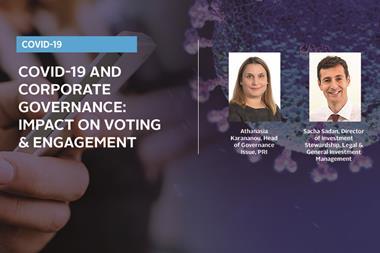Interested in the resources discussed in this episode?
EOS at Federated Hermes: How to move corporate purpose forward, Youmans, August 2019.
EOS at Federated Hermes: Statement of Purpose Guidance Document, Eccles & Youmans, August 2019.
WHAT DOES CORPORATE PURPOSE MEAN FOR INVESTORS?
Betina Boni
Hello, welcome to the PRI podcast. My name is Betina Boni and I’m a senior analyst in the PRI governance team.
In this podcast, we’ll be exploring what corporate purpose is. The buzz around corporate purpose makes it difficult to understand: is corporate purpose just a new term for corporate responsibility or ESG? A new word for a mission statement or a new form of corporation? And what role should investors play?
The pandemic has accelerated the conversation on corporate purpose and stakeholder governance. It’s raised a lot of debate around shareholder primacy and the urgent need to reform capitalism.
Today I’m joined by Tim Youmans, lead North America, EOS at Federated Hermes for the discussion. Tim, let’s start with the most fundamental question: what does corporate purpose actually mean?
Timothy Youmans
Thank you, Betina. I’m happy to be here today on behalf of Federated Hermes. We have one of the world’s largest investment stewardship teams with about over 60 professionals worldwide. And over 60 clients with about $1.6trn in assets under advice and we have been working on corporate purpose for a long time.
What I like to refer to is something that is in the latest report from the enacting purpose initiative from the noted author on purpose, professor Colin Mayor of Oxford in the second enacting purpose initiative report which covers North American companies. On page 15 Colin Mayer quotes his latest book where he says the purpose of a corporation is to solve the problems of people and planet profitably and not to profit from causing problems I think that’s a good place to start.
Betina Boni
This is perfectly clear. Thank you and so why should investors pay attention to corporate purpose?
Timothy Youmans
Corporate purpose again as cited in the enacting purpose initiative report which EOS at Federated Hermes co-leads…the enacting purpose initiative along with ah UC Berkeley Oxford and others in order to help both investors and corporations come together with a common view on corporate purpose. But why businesses and investors should care about corporate purpose is because it really is a way to extend the timeframe of the value proposition for companies both for their own good, for companies to act in their own long-term self-interest.
But also, in the interest of long-term investors. I just like to quote Clarence Otis, lead director of Verizon who is in the enacting purpose report number 2, when he says when corporate purpose produces more engaged employees, a better sense of where customers are and a broader social license to operate it not only shields against risk. But also confers a competitive advantage in shareholder returns over the long term. I think that’s well said on why purpose matters to both companies and investors.
Betina Boni
That sounds interesting. So, what does corporate purpose look like?
Timothy Youmans
So good corporate purpose. You know there’s sort of several ways to look at it. The most simplistic way to look at it is it should look like something what is actually stated by the company. Professor Bob Eccles of Oxford myself and retired Delaware chief justice Leo Story published an article for the Harvard Business Review a few summers ago, three ways to put your corporate purpose into action.
And so, a good corporate purpose. You know should be actually stated in a statement of purpose owned by the board. It should go along with integrated reporting and these two are interdependent as this is ESG, which is not corporate purpose.
How is environmental, social and governance factors that relate to the key stakeholders measured? That’s very important to corporate purpose and then this all kind of comes together in a new corporate form in the US called the public benefit corporation, a Delaware public benefit corporation system.
A large technology company has just converted to this form with 99% of shareholders supporting the conversion so that that’s one kind of three-way lens to look at it, kind of multi-stakeholder statement of purpose that’s published by the company linked to measures about ESG things that are important to value creating stakeholders.
It could also impact the corporate form, but it doesn’t have to necessarily. Another way to look at a very good corporate purpose is called through the score framework. And this is something that the enacting purpose initiative has published again. It’s in the enacting purpose report number 2 score: simplify the message about purpose should be simple. Connect. It should be connected to driving strategy and capital allocation. It should be owned by the board. The board should own it and publish it because managements change. You know the board and the purpose should transcend management tenures. The r of scores reward or should. Define performance metrics in compensation of executives that reinforce the purpose and then exemplify the purpose should exemplify and bring to life through vivid communications. The narrative of strategies to foster the shared identity between the key stakeholders of the corporation. So, the Score Framework is a more involved way to show a good corporate purpose but simply stating a purpose is a good start.
Betina Boni
This is super helpful Tim and so talking about the enacting purpose initiative, can you tell us a bit more about the work? You’ve been doing in the topic with the initiative and your other colleagues.
Timothy Youmans
Sure, EOS Federated Hermes ,as I said before, has been one of the co-leads of the enacting purpose initiative alongside Business School of Oxford Berkeley law BCG Brighthouse, The British Academy in the North America has been involved. And the goal here has just been to bring investors and companies together in Europe and North America to just further the dialogue about corporate purpose and to make it more actionable.
So far, they’ve produced four different deliverables. There was an enacting purpose report number 1 and acting purpose within the modern corporation of framework for boards and directors was mostly about European companies and again citing specific examples from European investors and from directors of European companies.
The report number two was very similar to report number one except it was North American investors and companies. The initiative has also put out a very detailed bibliography to accompany the first report, kind of a literature search citing all major updated academic resources on purpose, especially multi-stakeholder purpose and then a complementary paper to a separate Harvard Business Review article that launched the score framework is a paper called Measuring Purpose and Integrated Framework, which goes into great detail about the score framework that I just talked about connect own reward exemplify.
Betina Boni
And this is certainly super helpful for investors. What advice would you give to the to investors that want to start engaging on the topic?
Timothy Youmans
First of all, you know EOS Federated Hermes invented the field of investment stewardship seventeen years ago, engagement and voting recommendations is core to what we do and we’ve been doing it for a long time so engaging on corporate purpose, asking companies about it is one thing investors can do and it’s really not controversial. It just is sensible.
If companies do well by their customers, their employees, their communities, possibly the planet and the environment as well. Shareholders should do pretty well in the long term so everything kind of converges here. However, there is a difference in fiduciary duty. Professor Eccles and I when we were both at Harvard, we looked at fiduciary duty of both investors and companies in 34 countries now there’s several outgrowths of this. The PRI I has done very significant work in fiduciary duty in the twenty first century, I would encourage all listeners to read those especially those in the US, the US roadmap there’s a lot of contributors. The roadmaps are in the enacting purpose initiative reports as contributors as well. But fiduciary duty of investors is, I’ll just take the United States essentially to the sole interest of the beneficiaries that is a very different fiduciary duty than the duty of corporate directors around the world which is primarily to the long-term health and viability of the corporation as a legal entity, a separate legal entity. Arguably shareholder value is coequal in some jurisdictions but universally number one or co-number one is the duty to the separate entity called the corporation. That’s the duty of corporate directors and it’s important for investors to understand this that corporate director duty to the best interest of the corporation is different than investors. So, duty to the sole interest of their beneficiaries. So, understanding that difference when investors are communicating to directors of corporations is important.
Betina Boni
What do you see as the main challenge for investors engaging with companies to make companies understand the role of purpose?
Timothy Youmans
Many companies that are just getting into corporate purpose for the first time conflate purpose with yeah ESG and that has been the inactive purpose report number 2 for North America addresses this directly, corporate purpose is something that I tried to talk about in great detail using the score framework owned by the board and all the other elements. Its not ESG, environmental social and governance factors are the measures by which and again only a few of them are material GRI and SASB all agree on this conciseness is important in ESG reporting. But these are the metrics by which which important factors and only the material ones are measured to show progress on things like purpose but the conflation of purpose in ESG is something that investors need to guard against doing and help companies to deconflate. Purpose and esg.
Betina Boni
Well thank you so much for these insights and I think this really provides a good overview for investors, why they should be looking at this issue. Do you have any thoughts you’d like to share you know before we wrap up this conversation?
Timothy Youmans
Yes, all investors should encourage their biggest holdings, biggest value companies in their portfolios to have their boards of directors publish a statement of purpose. And that statement of purpose should include who are the most important stakeholders that are key to long-term value creation.
It’s probably something like customers, employees, communities, the planet, but it could be different. The company should define it. And as investors encourage companies to do this, it should be owned by the board and it should include the timeframe within which the board is going to reevaluate how these key stakeholders contribute to long-term value, therefore there is a linkage to long-term strategy. And Capital Allocation. So, all these things go together. Investors should encourage companies to do this in the interest of making companies be more long term in their value creation strategy actions and disclosures.
Betina Boni
Thank you so much for your time team.
Timothy Youmans I would like to thank you Bettina, I’d like to thank the PRI you know, Saker Nusseibeh our CEO reminds us all the time at the international business of Federated Hermes that at our former office was where many of the documents were formulated in the founding of the PRI, which is down the street from PRI’s headquarters. So, we really appreciate all the work over many years that the PRI does so thank you again.
Betina Boni
It was a real pleasure having you here. There are clearly challenges I had on the road that corporate purpose can play in creating a prosperous society.
We would really like your feedback on this episode, if you have any thoughts please email us at [email protected].
Thanks for listening and remember if you enjoyed this episode please do rate and subscribe and for more information on responsible investment, go to unpri.org


